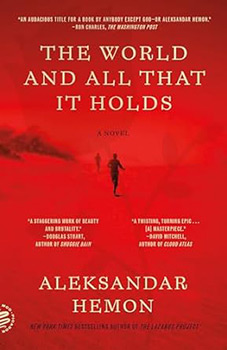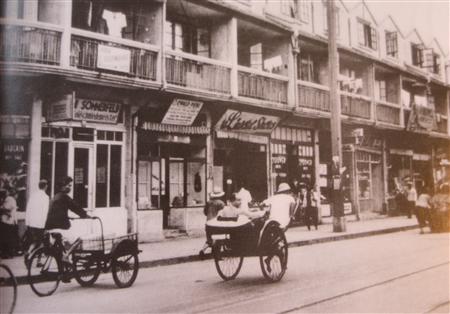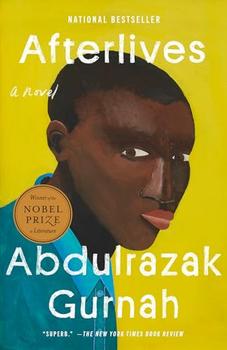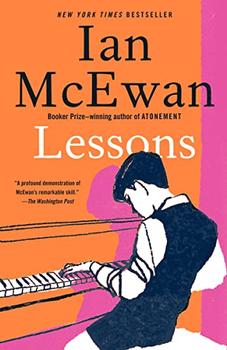Summary | Excerpt | Reviews | Beyond the book | Read-Alikes | Genres & Themes | Author Bio

A Novel
by Aleksandar HemonThe World and All That It Holds―in all its hilarious, heartbreaking, erotic, philosophical glory―showcases Aleksandar Hemon's celebrated talent at its pinnacle. It is a grand, tender, sweeping story that spans decades and continents. It cements Hemon as one of the boldest voices in fiction.
As the Archduke Franz Ferdinand arrives in Sarajevo one June day in 1914, Rafael Pinto is busy crushing herbs and grinding tablets behind the counter at the pharmacy he inherited from his estimable father. It's not quite the life he had expected during his poetry-filled student days in libertine Vienna, but it's nothing a dash of laudanum from the high shelf, a summer stroll, and idle fantasies about passersby can't put in perspective.
And then the world explodes. In the trenches in Galicia, fantasies fall flat. Heroism gets a man killed quickly. War devours all that they have known, and the only thing Pinto has to live for are the attentions of Osman, a fellow soldier, a man of action to complement Pinto's introspective, poetic soul; a charismatic storyteller; Pinto's protector and lover.
Together, Pinto and Osman will escape the trenches, survive near-certain death, tangle with spies and Bolsheviks. Over mountains and across deserts, from one world to another, all the way to Shanghai, it is Pinto's love for Osman―with the occasional opiatic interlude―that keeps him going.
The World and All That It Holds is Hemon's best novel, I think. It combines his interests—war and displacement; fables and storytelling; making sense of history; Sarajevo; espionage in East Asia—into a coherent, emotionally consistent narrative, unlike the incongruent chapters of Nowhere Man or the cynical, affected parallels of The Lazarus Project. And his prose is more freewheeling here: the repetitious phrases, the medley of languages, Pinto's attempts at religious poetry, the drug- or fever- or starvation-induced haziness—there's a kind of uncontrolled momentum. Hemon's other fiction tries too hard to be witty—to strike the perfect simile, or to shine a spotlight on some clarifying image. Here, there are no spotlights...continued
Full Review
(1143 words)
This review is available to non-members for a limited time. For full access,
become a member today.
(Reviewed by Chloe Pfeiffer).
 In Aleksandar Hemon's novel The World and All That It Holds, Rafael Pinto is a Sephardic Jew in Sarajevo at the beginning of the 20th century. When World War I erupts, he's flung east—first to Galicia, in what is now Ukraine and Poland, to fight for the Austro-Hungarian Empire; then to Tashkent, in what is now Uzbekistan, into a Russian prison; then, on foot, through the Taklamakan Desert. He has no passports or papers, no home to return to. He finally ends up in Shanghai, and lives there for almost 20 years.
In Aleksandar Hemon's novel The World and All That It Holds, Rafael Pinto is a Sephardic Jew in Sarajevo at the beginning of the 20th century. When World War I erupts, he's flung east—first to Galicia, in what is now Ukraine and Poland, to fight for the Austro-Hungarian Empire; then to Tashkent, in what is now Uzbekistan, into a Russian prison; then, on foot, through the Taklamakan Desert. He has no passports or papers, no home to return to. He finally ends up in Shanghai, and lives there for almost 20 years.
Indeed, Shanghai was a safe haven for more than 20,000 Jewish refugees in the 1930s and '40s. Most countries and cities had restricted entry for Jews trying to flee Nazi persecution in Europe. But Shanghai didn't require a...
This "beyond the book" feature is available to non-members for a limited time. Join today for full access.

If you liked The World and All That It Holds, try these:

by Abdulrazak Gurnah
Published 2023
From the winner of the 2021 Nobel Prize in Literature, a sweeping, multi-generational saga of displacement, loss, and love, set against the brutal colonization of East Africa.

by Ian McEwan
Published 2023
From the best-selling author of Atonement and Saturday comes the epic and intimate story of one man's life across generations and historical upheavals. From the Suez Crisis to the Cuban Missile Crisis, the fall of the Berlin Wall to the current pandemic, Roland Baines sometimes rides with the tide of history, but more often struggles against it.